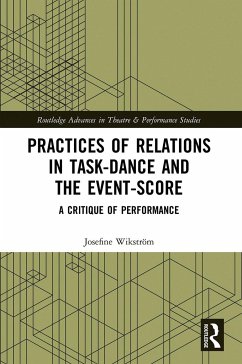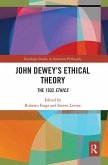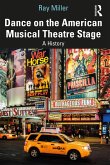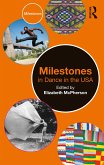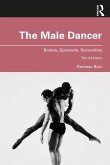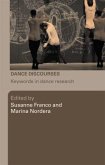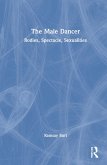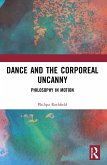- Broschiertes Buch
- Merkliste
- Auf die Merkliste
- Bewerten Bewerten
- Teilen
- Produkt teilen
- Produkterinnerung
- Produkterinnerung
In this study, Josefine Wikström challenges a concept of performance that makes no difference between art and non-art and argues for a new concept. This book confronts and criticises the way in which the dominating concept of performance has been used in art theory and performance and dance studies. Through an analysis of 1960s performance practices, Wikström focuses specifically on task-dance and event-score practices and provides an examination of the key philosophical concepts that are inseparable from such a concept of art and are necessary for the reconstruction of a critical concept of…mehr
Andere Kunden interessierten sich auch für
![John Dewey's Ethical Theory John Dewey's Ethical Theory]() John Dewey's Ethical Theory37,99 €
John Dewey's Ethical Theory37,99 €![Dance on the American Musical Theatre Stage Dance on the American Musical Theatre Stage]() Ray MillerDance on the American Musical Theatre Stage32,99 €
Ray MillerDance on the American Musical Theatre Stage32,99 €![Milestones in Dance in the USA Milestones in Dance in the USA]() Milestones in Dance in the USA32,99 €
Milestones in Dance in the USA32,99 €![The Male Dancer The Male Dancer]() Ramsay BurtThe Male Dancer33,99 €
Ramsay BurtThe Male Dancer33,99 €![Dance Discourses Dance Discourses]() Susanne Franco / Marina Nordera (eds.)Dance Discourses37,99 €
Susanne Franco / Marina Nordera (eds.)Dance Discourses37,99 €![The Male Dancer The Male Dancer]() Ramsay BurtThe Male Dancer123,99 €
Ramsay BurtThe Male Dancer123,99 €![Dance and the Corporeal Uncanny Dance and the Corporeal Uncanny]() Philipa RothfieldDance and the Corporeal Uncanny36,99 €
Philipa RothfieldDance and the Corporeal Uncanny36,99 €-
-
-
In this study, Josefine Wikström challenges a concept of performance that makes no difference between art and non-art and argues for a new concept. This book confronts and criticises the way in which the dominating concept of performance has been used in art theory and performance and dance studies. Through an analysis of 1960s performance practices, Wikström focuses specifically on task-dance and event-score practices and provides an examination of the key philosophical concepts that are inseparable from such a concept of art and are necessary for the reconstruction of a critical concept of performance, such as "practice", "experience", "object", "abstraction" and "structure". This book will be of great interest to scholars, students and practitioners across dance, performance art, aesthetics and art theory.
Produktdetails
- Produktdetails
- Routledge Advances in Theatre & Performance Studies
- Verlag: Routledge / Taylor & Francis
- Seitenzahl: 172
- Erscheinungstermin: 29. April 2022
- Englisch
- Abmessung: 234mm x 156mm x 10mm
- Gewicht: 235g
- ISBN-13: 9780367615475
- ISBN-10: 0367615479
- Artikelnr.: 64104365
- Herstellerkennzeichnung
- Books on Demand GmbH
- In de Tarpen 42
- 22848 Norderstedt
- info@bod.de
- 040 53433511
- Routledge Advances in Theatre & Performance Studies
- Verlag: Routledge / Taylor & Francis
- Seitenzahl: 172
- Erscheinungstermin: 29. April 2022
- Englisch
- Abmessung: 234mm x 156mm x 10mm
- Gewicht: 235g
- ISBN-13: 9780367615475
- ISBN-10: 0367615479
- Artikelnr.: 64104365
- Herstellerkennzeichnung
- Books on Demand GmbH
- In de Tarpen 42
- 22848 Norderstedt
- info@bod.de
- 040 53433511
Josefine Wikström is Associate Professor of Dance Theory at Stockholm University of the Arts.
Content
Acknowledgements
Introduction: From a cultural to a critical concept of performance
Chapter 1. Practice: Performance a practice of relations
Chapter 2. Experience: Art as experience or an art to experience?
2.1. Dewey's concept of experience: Unmediated interaction
2.2. Art as experience: Ono and Forti
2.3. Critical limits of Dewey's experience: Kant versus Dewey
Chapter 3. Object: Acts of negations of the medium-specific art object
3.1. The minimalist and the de-materialised object
3.2. From independent things to acts of the subject
3.2. Dance and event as object: Kant
3.3. Phenomenal objectivities in task-dance and event-score practices: Husserl
Chapter 4. Abstraction: Task-dance's abstract ontology
4.1. Rainer's No-Manifesto and other negations
4.2. The social form of abstract labour: Marx
4.3. The autonomous artwork in Adorno
4.4. Division of labour, abstract time and the disciplined body.
Chapter 5. Structure: The performative structure-object
5.1. Structural objects in task-dance and in structuralism: Trisha Brown' Accumulation
5.2. The Performativity of the Cartesian I
5.3. Labour in general, art in general, performance in general
Notes
Bibliography
Index of names
Subject index
Index of works
Acknowledgements
Introduction: From a cultural to a critical concept of performance
- Performance, performativity and its disciples
- Marx's epistemology: A critical methodology
- Post-mediality and a generic concept of performance
- Task-Dance and the Event-Score: Epistemological Problems
Chapter 1. Practice: Performance a practice of relations
- Practice and a metaphysics of practice in Aristotle
- From action painting to performance art
- From musical modernism to performance in general
- Marx's relational practice: Smith, Hegel and Feuerbach
- Performance, a practice of relations
Chapter 2. Experience: Art as experience or an art to experience?
2.1. Dewey's concept of experience: Unmediated interaction
2.2. Art as experience: Ono and Forti
2.3. Critical limits of Dewey's experience: Kant versus Dewey
Chapter 3. Object: Acts of negations of the medium-specific art object
3.1. The minimalist and the de-materialised object
3.2. From independent things to acts of the subject
3.2. Dance and event as object: Kant
3.3. Phenomenal objectivities in task-dance and event-score practices: Husserl
Chapter 4. Abstraction: Task-dance's abstract ontology
4.1. Rainer's No-Manifesto and other negations
4.2. The social form of abstract labour: Marx
4.3. The autonomous artwork in Adorno
4.4. Division of labour, abstract time and the disciplined body.
Chapter 5. Structure: The performative structure-object
5.1. Structural objects in task-dance and in structuralism: Trisha Brown' Accumulation
5.2. The Performativity of the Cartesian I
5.3. Labour in general, art in general, performance in general
Notes
Bibliography
Index of names
Subject index
Index of works
Content
Acknowledgements
Introduction: From a cultural to a critical concept of performance
* Performance, performativity and its disciples
* Marx's epistemology: A critical methodology
* Post-mediality and a generic concept of performance
* Task-Dance and the Event-Score: Epistemological Problems
Chapter 1. Practice: Performance a practice of relations
1. Practice and a metaphysics of practice in Aristotle
2. From action painting to performance art
3. From musical modernism to performance in general
4. Marx's relational practice: Smith, Hegel and Feuerbach
5. Performance, a practice of relations
Chapter 2. Experience: Art as experience or an art to experience?
2.1. Dewey's concept of experience: Unmediated interaction
2.2. Art as experience: Ono and Forti
2.3. Critical limits of Dewey's experience: Kant versus Dewey
Chapter 3. Object: Acts of negations of the medium-specific art object
3.1. The minimalist and the de-materialised object
3.2. From independent things to acts of the subject
3.2. Dance and event as object: Kant
3.3. Phenomenal objectivities in task-dance and event-score practices:
Husserl
Chapter 4. Abstraction: Task-dance's abstract ontology
4.1. Rainer's No-Manifesto and other negations
4.2. The social form of abstract labour: Marx
4.3. The autonomous artwork in Adorno
4.4. Division of labour, abstract time and the disciplined body.
Chapter 5. Structure: The performative structure-object
5.1. Structural objects in task-dance and in structuralism: Trisha Brown'
Accumulation
5.2. The Performativity of the Cartesian I
5.3. Labour in general, art in general, performance in general
Notes
Bibliography
Index of names
Subject index
Index of works
Acknowledgements
Introduction: From a cultural to a critical concept of performance
* Performance, performativity and its disciples
* Marx's epistemology: A critical methodology
* Post-mediality and a generic concept of performance
* Task-Dance and the Event-Score: Epistemological Problems
Chapter 1. Practice: Performance a practice of relations
1. Practice and a metaphysics of practice in Aristotle
2. From action painting to performance art
3. From musical modernism to performance in general
4. Marx's relational practice: Smith, Hegel and Feuerbach
5. Performance, a practice of relations
Chapter 2. Experience: Art as experience or an art to experience?
2.1. Dewey's concept of experience: Unmediated interaction
2.2. Art as experience: Ono and Forti
2.3. Critical limits of Dewey's experience: Kant versus Dewey
Chapter 3. Object: Acts of negations of the medium-specific art object
3.1. The minimalist and the de-materialised object
3.2. From independent things to acts of the subject
3.2. Dance and event as object: Kant
3.3. Phenomenal objectivities in task-dance and event-score practices:
Husserl
Chapter 4. Abstraction: Task-dance's abstract ontology
4.1. Rainer's No-Manifesto and other negations
4.2. The social form of abstract labour: Marx
4.3. The autonomous artwork in Adorno
4.4. Division of labour, abstract time and the disciplined body.
Chapter 5. Structure: The performative structure-object
5.1. Structural objects in task-dance and in structuralism: Trisha Brown'
Accumulation
5.2. The Performativity of the Cartesian I
5.3. Labour in general, art in general, performance in general
Notes
Bibliography
Index of names
Subject index
Index of works
Content
Acknowledgements
Introduction: From a cultural to a critical concept of performance
Chapter 1. Practice: Performance a practice of relations
Chapter 2. Experience: Art as experience or an art to experience?
2.1. Dewey's concept of experience: Unmediated interaction
2.2. Art as experience: Ono and Forti
2.3. Critical limits of Dewey's experience: Kant versus Dewey
Chapter 3. Object: Acts of negations of the medium-specific art object
3.1. The minimalist and the de-materialised object
3.2. From independent things to acts of the subject
3.2. Dance and event as object: Kant
3.3. Phenomenal objectivities in task-dance and event-score practices: Husserl
Chapter 4. Abstraction: Task-dance's abstract ontology
4.1. Rainer's No-Manifesto and other negations
4.2. The social form of abstract labour: Marx
4.3. The autonomous artwork in Adorno
4.4. Division of labour, abstract time and the disciplined body.
Chapter 5. Structure: The performative structure-object
5.1. Structural objects in task-dance and in structuralism: Trisha Brown' Accumulation
5.2. The Performativity of the Cartesian I
5.3. Labour in general, art in general, performance in general
Notes
Bibliography
Index of names
Subject index
Index of works
Acknowledgements
Introduction: From a cultural to a critical concept of performance
- Performance, performativity and its disciples
- Marx's epistemology: A critical methodology
- Post-mediality and a generic concept of performance
- Task-Dance and the Event-Score: Epistemological Problems
Chapter 1. Practice: Performance a practice of relations
- Practice and a metaphysics of practice in Aristotle
- From action painting to performance art
- From musical modernism to performance in general
- Marx's relational practice: Smith, Hegel and Feuerbach
- Performance, a practice of relations
Chapter 2. Experience: Art as experience or an art to experience?
2.1. Dewey's concept of experience: Unmediated interaction
2.2. Art as experience: Ono and Forti
2.3. Critical limits of Dewey's experience: Kant versus Dewey
Chapter 3. Object: Acts of negations of the medium-specific art object
3.1. The minimalist and the de-materialised object
3.2. From independent things to acts of the subject
3.2. Dance and event as object: Kant
3.3. Phenomenal objectivities in task-dance and event-score practices: Husserl
Chapter 4. Abstraction: Task-dance's abstract ontology
4.1. Rainer's No-Manifesto and other negations
4.2. The social form of abstract labour: Marx
4.3. The autonomous artwork in Adorno
4.4. Division of labour, abstract time and the disciplined body.
Chapter 5. Structure: The performative structure-object
5.1. Structural objects in task-dance and in structuralism: Trisha Brown' Accumulation
5.2. The Performativity of the Cartesian I
5.3. Labour in general, art in general, performance in general
Notes
Bibliography
Index of names
Subject index
Index of works
Content
Acknowledgements
Introduction: From a cultural to a critical concept of performance
* Performance, performativity and its disciples
* Marx's epistemology: A critical methodology
* Post-mediality and a generic concept of performance
* Task-Dance and the Event-Score: Epistemological Problems
Chapter 1. Practice: Performance a practice of relations
1. Practice and a metaphysics of practice in Aristotle
2. From action painting to performance art
3. From musical modernism to performance in general
4. Marx's relational practice: Smith, Hegel and Feuerbach
5. Performance, a practice of relations
Chapter 2. Experience: Art as experience or an art to experience?
2.1. Dewey's concept of experience: Unmediated interaction
2.2. Art as experience: Ono and Forti
2.3. Critical limits of Dewey's experience: Kant versus Dewey
Chapter 3. Object: Acts of negations of the medium-specific art object
3.1. The minimalist and the de-materialised object
3.2. From independent things to acts of the subject
3.2. Dance and event as object: Kant
3.3. Phenomenal objectivities in task-dance and event-score practices:
Husserl
Chapter 4. Abstraction: Task-dance's abstract ontology
4.1. Rainer's No-Manifesto and other negations
4.2. The social form of abstract labour: Marx
4.3. The autonomous artwork in Adorno
4.4. Division of labour, abstract time and the disciplined body.
Chapter 5. Structure: The performative structure-object
5.1. Structural objects in task-dance and in structuralism: Trisha Brown'
Accumulation
5.2. The Performativity of the Cartesian I
5.3. Labour in general, art in general, performance in general
Notes
Bibliography
Index of names
Subject index
Index of works
Acknowledgements
Introduction: From a cultural to a critical concept of performance
* Performance, performativity and its disciples
* Marx's epistemology: A critical methodology
* Post-mediality and a generic concept of performance
* Task-Dance and the Event-Score: Epistemological Problems
Chapter 1. Practice: Performance a practice of relations
1. Practice and a metaphysics of practice in Aristotle
2. From action painting to performance art
3. From musical modernism to performance in general
4. Marx's relational practice: Smith, Hegel and Feuerbach
5. Performance, a practice of relations
Chapter 2. Experience: Art as experience or an art to experience?
2.1. Dewey's concept of experience: Unmediated interaction
2.2. Art as experience: Ono and Forti
2.3. Critical limits of Dewey's experience: Kant versus Dewey
Chapter 3. Object: Acts of negations of the medium-specific art object
3.1. The minimalist and the de-materialised object
3.2. From independent things to acts of the subject
3.2. Dance and event as object: Kant
3.3. Phenomenal objectivities in task-dance and event-score practices:
Husserl
Chapter 4. Abstraction: Task-dance's abstract ontology
4.1. Rainer's No-Manifesto and other negations
4.2. The social form of abstract labour: Marx
4.3. The autonomous artwork in Adorno
4.4. Division of labour, abstract time and the disciplined body.
Chapter 5. Structure: The performative structure-object
5.1. Structural objects in task-dance and in structuralism: Trisha Brown'
Accumulation
5.2. The Performativity of the Cartesian I
5.3. Labour in general, art in general, performance in general
Notes
Bibliography
Index of names
Subject index
Index of works

